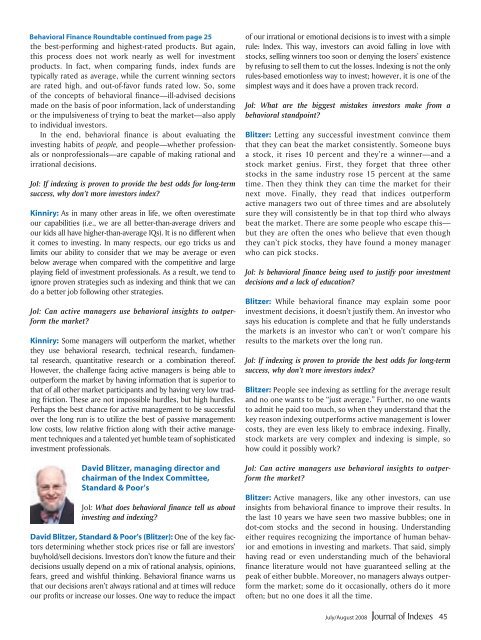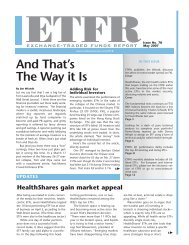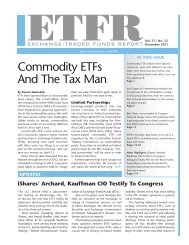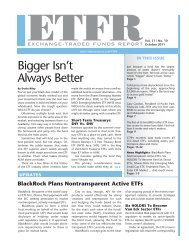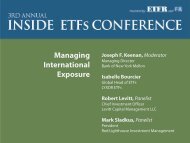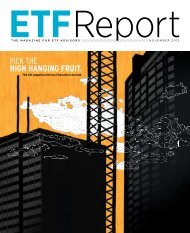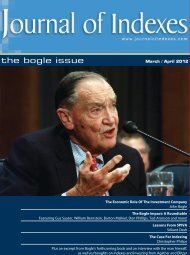Download - IndexUniverse.com
Download - IndexUniverse.com
Download - IndexUniverse.com
Create successful ePaper yourself
Turn your PDF publications into a flip-book with our unique Google optimized e-Paper software.
Behavioral Finance Roundtable continued from page 25<br />
the best-performing and highest-rated products. But again,<br />
this process does not work nearly as well for investment<br />
products. In fact, when <strong>com</strong>paring funds, index funds are<br />
typically rated as average, while the current winning sectors<br />
are rated high, and out-of-favor funds rated low. So, some<br />
of the concepts of behavioral finance—ill-advised decisions<br />
made on the basis of poor information, lack of understanding<br />
or the impulsiveness of trying to beat the market—also apply<br />
to individual investors.<br />
In the end, behavioral finance is about evaluating the<br />
investing habits of people, and people—whether professionals<br />
or nonprofessionals—are capable of making rational and<br />
irrational decisions.<br />
JoI: If indexing is proven to provide the best odds for long-term<br />
success, why don’t more investors index?<br />
Kinniry: As in many other areas in life, we often overestimate<br />
our capabilities (i.e., we are all better-than-average drivers and<br />
our kids all have higher-than-average IQs). It is no different when<br />
it <strong>com</strong>es to investing. In many respects, our ego tricks us and<br />
limits our ability to consider that we may be average or even<br />
below average when <strong>com</strong>pared with the <strong>com</strong>petitive and large<br />
playing field of investment professionals. As a result, we tend to<br />
ignore proven strategies such as indexing and think that we can<br />
do a better job following other strategies.<br />
JoI: Can active managers use behavioral insights to outperform<br />
the market?<br />
Kinniry: Some managers will outperform the market, whether<br />
they use behavioral research, technical research, fundamental<br />
research, quantitative research or a <strong>com</strong>bination thereof.<br />
However, the challenge facing active managers is being able to<br />
outperform the market by having information that is superior to<br />
that of all other market participants and by having very low trading<br />
friction. These are not impossible hurdles, but high hurdles.<br />
Perhaps the best chance for active management to be successful<br />
over the long run is to utilize the best of passive management:<br />
low costs, low relative friction along with their active management<br />
techniques and a talented yet humble team of sophisticated<br />
investment professionals.<br />
David Blitzer, managing director and<br />
chairman of the Index Committee,<br />
Standard & Poor’s<br />
JoI: What does behavioral finance tell us about<br />
investing and indexing?<br />
David Blitzer, Standard & Poor’s (Blitzer): One of the key factors<br />
determining whether stock prices rise or fall are investors’<br />
buy/hold/sell decisions. Investors don’t know the future and their<br />
decisions usually depend on a mix of rational analysis, opinions,<br />
fears, greed and wishful thinking. Behavioral finance warns us<br />
that our decisions aren’t always rational and at times will reduce<br />
our profits or increase our losses. One way to reduce the impact<br />
of our irrational or emotional decisions is to invest with a simple<br />
rule: Index. This way, investors can avoid falling in love with<br />
stocks, selling winners too soon or denying the losers’ existence<br />
by refusing to sell them to cut the losses. Indexing is not the only<br />
rules-based emotionless way to invest; however, it is one of the<br />
simplest ways and it does have a proven track record.<br />
JoI: What are the biggest mistakes investors make from a<br />
behavioral standpoint?<br />
Blitzer: Letting any successful investment convince them<br />
that they can beat the market consistently. Someone buys<br />
a stock, it rises 10 percent and they’re a winner—and a<br />
stock market genius. First, they forget that three other<br />
stocks in the same industry rose 15 percent at the same<br />
time. Then they think they can time the market for their<br />
next move. Finally, they read that indices outperform<br />
active managers two out of three times and are absolutely<br />
sure they will consistently be in that top third who always<br />
beat the market. There are some people who escape this—<br />
but they are often the ones who believe that even though<br />
they can’t pick stocks, they have found a money manager<br />
who can pick stocks.<br />
JoI: Is behavioral finance being used to justify poor investment<br />
decisions and a lack of education?<br />
Blitzer: While behavioral finance may explain some poor<br />
investment decisions, it doesn’t justify them. An investor who<br />
says his education is <strong>com</strong>plete and that he fully understands<br />
the markets is an investor who can’t or won’t <strong>com</strong>pare his<br />
results to the markets over the long run.<br />
JoI: If indexing is proven to provide the best odds for long-term<br />
success, why don’t more investors index?<br />
Blitzer: People see indexing as settling for the average result<br />
and no one wants to be “just average.” Further, no one wants<br />
to admit he paid too much, so when they understand that the<br />
key reason indexing outperforms active management is lower<br />
costs, they are even less likely to embrace indexing. Finally,<br />
stock markets are very <strong>com</strong>plex and indexing is simple, so<br />
how could it possibly work?<br />
JoI: Can active managers use behavioral insights to outperform<br />
the market?<br />
Blitzer: Active managers, like any other investors, can use<br />
insights from behavioral finance to improve their results. In<br />
the last 10 years we have seen two massive bubbles; one in<br />
dot-<strong>com</strong> stocks and the second in housing. Understanding<br />
either requires recognizing the importance of human behavior<br />
and emotions in investing and markets. That said, simply<br />
having read or even understanding much of the behavioral<br />
finance literature would not have guaranteed selling at the<br />
peak of either bubble. Moreover, no managers always outperform<br />
the market; some do it occasionally, others do it more<br />
often; but no one does it all the time.<br />
July/August 2008<br />
45


